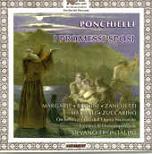This is an almost cartoonishly bad performance of Ponchielli’s first–and much revised–opera. It was first seen in 1856, and while a moderate success, the libretto was considered so bad that the opera disappeared. Later another composer set the same story, to better effect, and in 1872, with a revised libretto and music, Ponchielli again presented the work. The libretto was still acknowledged as very weak, but the opera itself fared better.
I won’t go into the plot here–it really is appallingly dumb and incoherent, even by mid-19th century Italian opera standards–but it’s educational to know that a note at the start of the libretto acknowledges that there are undeveloped “threads of the plot”. Scenes are disjointed, motivations are weak or puzzling, and so on. A thumbnail evaluation of the music, however, would have to concede a certain tunefulness, the occasional piece of genuinely clever writing (a scene for mezzo and soprano with offstage choral interjections, for instance), and a few stirring if formulaic rum-tum-tum arias and duets. In other words, a really good performance might please in the way that, say, Verdi’s Alzira and Il Corsaro please: they have lousy plots and are no musical masterpieces, but they’re clearly the work of a composer who knows what he’s doing.
This performance, on the other hand, makes you want to find the score and burn it. A picture or two in the accompanying booklet of the concert performance from which I believe this recording is taken shows us what appears to be a student orchestra, so I won’t dwell too long on the out-of-tune string playing, the hideous tone of the oboes, or the mundane, note-for-note phrasing. Nor, in the quest for kindness, will I mention the chorus, which has enough to do so that the lack of professionalism in general and the under-pitch caterwauling of the tenors really grates, albeit in a laughing-through-your-tears, Florence Foster Jenkins sort of way.
And speaking of her, the mezzo who sings the role of “the Lady of Monza”–a nun who shows up in Part 3, dominates the action for 15 minutes, and then disappears–makes some of the nastiest untrained sounds in history, seconded only by the lead soprano (Lucia, sung by one Natalia Margarit), who is so terrible in the opera’s first half that she seems to be parodying the art form. The biggest role is that of Don Rodrigo, here taken by baritone Maurizio Zanchetti, who is dreadful, although bass Gianfranco Zuccarino, singing Fra’ Cristoforo, is equally bad. Tenor Marcello Bedoni, as the tenor person, is very good. We should chip in and get him out of the Ukraine as soon as possible. [7/20/2004]
































